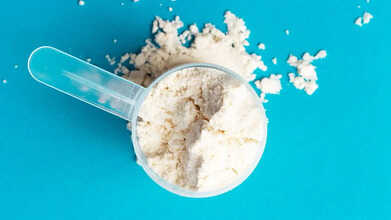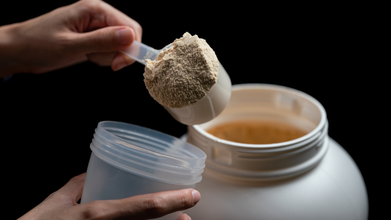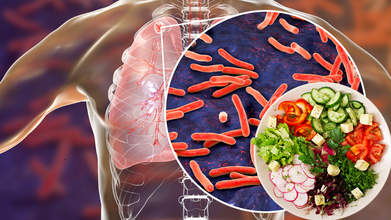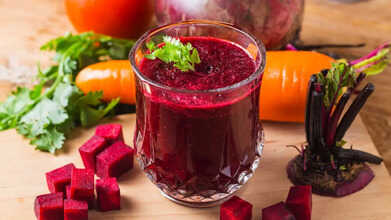- Health Conditions A-Z
- Health & Wellness
- Nutrition
- Fitness
- Health News
- Ayurveda
- Videos
- Medicine A-Z
- Parenting
- Web Stories
As Unsafe Levels of Lead Are Found in Protein Powders, Here Are Safer Alternatives You Can Switch To

Credits: Canva
Protein powder lead consumer reports: Some protein powders and shakes have been found to contain unsafe amounts of lead, according to a recent Consumer Reports investigation. The report, released Tuesday, analyzed 23 protein products, including dairy, beef, and plant-based supplements and revealed that over two-thirds contained more lead per serving than what experts consider safe, which is around 0.5 micrograms a day.
With growing concern over heavy metal contamination in protein powders, it’s worth exploring healthier, safer alternatives to meet your protein needs.
Protein Powders, Shakes Contain High Levels of Lead and Other Metals, Consumer Reports Finds
“Protein powders and shakes have become incredibly popular among people looking to add more protein to their diet,” said Brian Ronholm, director of food policy at Consumer Reports, in a news release. “Our tests found that toxic heavy metal contamination in protein supplements is widespread and has worsened since we first examined these products 15 years ago.”
According to the findings, plant-based protein powders had the highest levels of lead, averaging about nine times more than dairy-based options like whey and twice as much as beef-based products.
Among the products tested, Naked Nutrition’s Vegan Mass Gainer and Huel’s Black Edition were identified as containing the highest levels of lead and were listed under “products to avoid.” The full list of tested brands is available in the report.
Protein Powder Lead Consumer Reports: Alternatives To Protein Powder And Health Supplements
Andrew Mock, MD, MPH, a preventive and lifestyle medicine specialist at Loma Linda University Health and also California’s Strongest Man says the flood of protein products in the fitness market can often lead people to spend large sums on items that may not be beneficial, necessary, or even safe.
“For a non-active adult, about 0.8 grams of protein per kilogram of body weight is enough to prevent deficiency,” Mock explains. “For those who exercise regularly, the target should be 1.2 to 1.6 grams per kilogram daily. Higher amounts can be safe, but most people don’t actually need that much.”
Although protein shakes are convenient, nearly half of Americans (46%) drink them regularly Mock notes that they are not essential.
“You can easily meet your protein needs with regular food,” he says. “Protein powders and ready-to-drink shakes are helpful for busy days, but they shouldn’t be treated as dietary must-haves.”
Whole food protein sources include:
- Eggs
- Fish such as salmon, tuna, and cod
- Greek yogurt
- Cottage cheese
- Milk
- Beans like black, kidney, and lentils
- Chickpeas
- Tofu
- Quinoa
- Chia seeds
- Flaxseeds
- Nut butters such as peanut, almond, or cashew
When time allows, homemade protein shakes made with natural ingredients are another safe and nutritious choice.
What Safe Supplements Should You Take?
While supplement companies are required to register with the U.S. Food and Drug Administration (FDA), the agency doesn’t routinely test their products. This lack of regular oversight raises safety issues, including contamination.
“It’s surprisingly common for even well-known supplement brands to contain harmful ingredients,” Mock warns. “These can include heavy metals, anabolic steroids, or other banned substances. One study even found that one in eight supplements contained illicit materials.”
Contamination has been detected across various products, from protein powders and multivitamins to herbal capsules with some not even containing what their labels promise.
To reduce these risks, Mock advises checking packaging for third-party testing certifications, which confirm that a product meets strict safety standards.
“Look for labels such as the National Science Foundation (NSF) mark, or certifications like Informed for Sport and Certified for Sport,” he says. “Another key label is current Good Manufacturing Practice (cGMP), which means the supplement is produced under proper safety and hygiene conditions monitored by the FDA.”
These certifications offer a level of reassurance that a supplement has been independently tested and verified. By checking for them, consumers can make smarter and safer choices when buying protein powders or other health products.
High Levels Of Lead Found In Protein Powders And Shakes, Reveals Consumer Reports

Credits: Canva
Consumer Reports Protein Powder: The Consumer Reports Protein Powder Investigation, titled 'Protein Powders and Shakes Contain High Levels of Lead', revealed, as the name suggests that some of the most popular and widely known protein powder were found with leads and other metal contents. The report was published on Tuesday, which analyzed 23 protein powder and shakes. The range included dairy, beef and plant-based protein supplements. The analysis found that more than two-thirds of the products contained more lead in a single serving than what experts consider to be safe, around 0.5 micrograms per day.
Also Read: Is Huntington’s Disease Genetic? Here’s Everything You Should Know
Brian Ronholm, director of food policy at Consumer Reports in a news release said, "Protein powders and shakes have become immensely popular and are part of a daily routine for many people who are focused on consuming more protein in their diet. Protein powders and shakes have become immensely popular and are part of a daily routine for many people who are focused on consuming more protein in their diet."
Lead Levels, Which Protein Powder Has The Most?
On average, the lead levels in plant-based products were the highest. The report revealed that it was nine times the amount found in dairy-based proteins, like whey. When compared to beef-based products, the plant-based powders had twice as much lead in it.
The Consumer Reports also published a list of products to avoid, among them, at the top were two plant-based protein powders by the brand Naked Nutrition Vegan Mass Gainer and Huel Black Edition. The former one contained 1,572% more lead than the level approved, while the latter one contained 1,288% over the approved level. The Consumer Report suggested that these powders should not be consumed at all, while for other products, it did provide the servings per week limit.
The categories are:
- Products to Avoid
- Recommend Limiting to Once a Week
- Okay to Eat Occasionally
- Better Choices for Daily Consumption
The Consumer Reports provided that Muscle Tech Mass Gainer showed no lead in its product, thus no limit was placed on it.
Consumer Reports Protein Powder: How Was The Test Conducted?
The Consumer Reports in its report writes that they purchased multiple samples of each product, including two to four distinct lots, over a three-month period beginning last November. These products were brought anonymously from online retailers and food stores. The samples from multiple lot were tested for levels of protein, arsenic, cadmium, lead, and other elements. However the report notes: "the results are based on an average of these samples, which were collected over a specific period of time, they may not mirror current contaminant levels in every product. Even so, the findings highlight why consumers should carefully consider the role of protein powders and shakes in their diet."
How Did The Protein Powder Companies Respond?
7 of the 23 companies did not respond for comments, but those who responded said that lead is a naturally occurring element that is difficult to avoid, especially in plant-based products. Eight companies, namely: Equip Foods, Garden of Life, KOS, Momentous, Muscle Meds, Muscle Tech, Orgain, and Vega, said they test both their ingredients and finished products for heavy metals.
WHO’s Latest TB Guidelines Highlight Nutrition as Key to Treatment

Credits: Canva
The World Health Organization (WHO) has released new guidelines, which would tackle tuberculosis (TB) and under-nutrition together. The WHO has recommended that food assistance must be provided to households with TB patients and the undernourished or food insecure must be screened for the disease.
This has come after the Reduction Activation of Tuberculosis by Improvement of Nutritional Status (RATIONS) trial by Indian researchers. This has inspired a global shift in the TB policy.
What Are The RATIONS trial?
These trials were conducted in Jharkhand and were published in The Lancet and The Lancet Global. The trials highlighted the vital role nutrition plays in the reduction of mortality among people who are living with TB. It also helps in reducing the incidence among household contacts of pulmonary tuberculosis patients.
The ICMR-supported RATIONS trial were also led by a research team headed by Dr Anurag Bhargava and Dr Madhavi Bhargava from Kasturba Medical College and Yenepoya Medical College, respectively.
The studies also showed that weight gain in the first two months was associated with a 60% lower risk of TB mortality. It also showed higher treatment success and also a decrease in loss to follow-up.
How Does Nutrition Help With TB Patients?
As per a 2009 study published in the Lung India, the Official Publication of Indian Chest Society, in patients with TB, it leads to reduction in appetite, nutrient malabsorption, micronutrient malabsorption, and altered metabolism. The study notes that both, protein-energy malnutrition and micronutrients deficiencies could increase the risk of TB.
The study revealed that malnourished TB patients experience slower recovery and higher mortality compared to those who are well-nourished. Nutritional status often improves during TB treatment, but high rates of HIV in developing countries worsen the impact of malnutrition on the disease.
Childhood TB and tuberculin skin test outcomes are also affected by poor nutrition. Experts suggest that nutritional supplementation could support faster recovery in TB patients, while improving overall population nutrition may serve as an effective strategy to control tuberculosis in underdeveloped regions.
What Should One Eat To Recover From TB?
The Nanavati Max Super Speciality Hospital on its website notes that dietary guidelines play a crucial role in the management of TB. So, what must someone recovering from TB consume?
Protein-rich Foods
Foods like eggs, lean meat, poultry, fish, beans, lentils and nuts are excellent sources of protein. Consuming protein-rich foods help in prevention of muscle loss, and promoted healing.
High-calorie Foods
Extra aid in recovery is never too bad, thus consuming high-calorie foods can provide the necessary energy one needs while recovering. Some high-calorie food that can also be included in the diet are: yoghurt, dried fruits, whole milk, peanut butter, nuts, cheese, avocados, dark chocolate and granola bars.
Micronutrients
Studies too have shown that micronutrients are essential, and they play a crucial role in maintaining the immune system. Thus, one can add leafy vegetables, berries, citrus fruits, nuts and seeds.
Other things you can include are high-energy foods, good carbs, and some super foods. What you must avoid are fried foods, alcohol, smoking and processed foods.
ABC Juice: This Everyday Drink Could Be Your Secret Health Weapon, Nutritionist Explains How

Credits: Canva
Drinking juice is a simple and enjoyable way to add vital nutrients to your daily diet. Many people like to kickstart their mornings with a glass of fresh juice, whether it’s the popular green juice or the classic orange juice. Among the wide variety of wellness drinks, ABC juice has carved a niche for itself, offering health benefits that many other beverages can’t match. We spoke with Lena Bakovic, an experienced Registered Dietitian Nutritionist with over eight years in the field at Top Nutrition Coaching, who shared the many advantages of including ABC juice in your routine.
What Is ABC Juice?
According to Lena, ABC juice combines raw apples, beetroots, and carrots, creating a drink packed with essential nutrients. It offers fibre, antioxidants, and several micronutrients, including potassium, zinc, and iron. Here’s a closer look at each ingredient:
- Apple: Apples are loaded with fibre, vitamin C, potassium, and vitamin E. They support digestive health, promote heart health, and can help with weight management.
- Beetroot: Beetroots are nutrient-rich while being low in calories. They provide folate, fibre, vitamin C, potassium, iron, and even a small amount of protein.
- Carrot: Carrots are a great source of vitamin A, essential for healthy eyesight. They also contain potassium, vitamin B6, biotin, fibre, and vitamin K.
Benefits Of ABC Juice
Lena told us that ABC juice is generally low in calories, making it ideal for those keeping an eye on their weight. Its fibre content supports gut health, aiding digestion and overall intestinal function. The iron in the juice can also be helpful for those with iron deficiency anemia, potentially helping to replenish iron stores.
Additionally, the antioxidants in ABC juice may help fight free radicals, which in excess can contribute to chronic conditions like cardiovascular disease and certain cancers. While the juice’s nutrient richness may support immune health, strong scientific evidence is lacking. Similarly, claims that ABC juice boosts metabolism are not yet backed by robust clinical trials.
How To Make ABC Juice
Making ABC juice at home is easy and requires just a few simple steps. Here’s the method:
Ingredients:
- 2 apples
- 1 medium beetroot
- 2 carrots
- Optional: a splash of lemon juice or a small piece of ginger for extra flavour
Instructions:
- Rinse the apples, beetroot, and carrots thoroughly.
- Peel the beetroot and carrots.
- Remove the cores from the apples and chop them into smaller pieces.
- Cut the beetroot and carrots into chunks.
Juicing:
- Using a juicer: Feed the apple pieces, beetroot chunks, and carrot pieces into the juicer, collecting the juice in a container.
- Using a blender: Add the chopped apples, beetroot, and carrots to the blender. Blend until smooth, adding a little water if needed. Then strain the mixture through a fine mesh sieve or cheesecloth to separate the juice from the pulp.
- Add Optional Ingredients: Mix in a bit of lemon juice or a small piece of ginger for extra flavour if desired.
Serve:
Pour the juice into a glass and enjoy immediately to get the best taste and nutritional benefits.
Storage:
Any leftover juice can be kept in an airtight container in the fridge for up to 24 hours.
Enjoy your refreshing, nutrient-packed ABC juice!
© 2024 Bennett, Coleman & Company Limited

